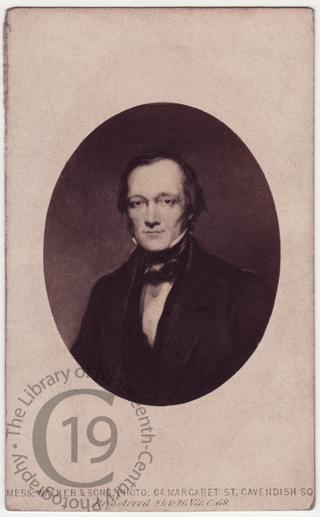
Sir Richard Owen
A carte-de-visite portrait of Sir Richard Owen (1804-1892), pioneering comparative anatomist.
It was Sir Richard Owen who first coined the term dinosauria (from the Greek deinos meaning fearfully great, and sauros meaning lizard), recognizing them as a suborder of large, extinct reptiles. He first proposed this name in an article published in the Proceedings of the British Association for the Advancement of the Sciences in 1842, having noticed that a group of fossils (which included remains of Megalosaurus, Iguanodon, and Hylaeosaurus) had certain characteristics in common. He was later criticized for failing to acknowledge that others had already come to the same conclusions, but by building on the groundwork of Gideon Mantell, he cleverly appropriated the ‘terrible lizards’ as his own and a bitter rivalry developed between the two men.
Owen presented dinosaurs as a separate taxonomic group in order to support his arguments against the newly proposed theory of evolution. (Although Darwin’s Origin of the Species wasn’t published until 1859, the basic ideas of evolution were already circulating, but its mechanisms, including natural selection, were not yet known). Although early in his career Owen did not believe in the transmutation of species, he came to believe in a form of evolution, and does not entirely deserve his reputation as an anti-evolutionist, a reputation he owes to his long-standing feud with Darwin’s most faithful supporters, Thomas Henry Huxley, one of the most famous battles in Victorian science. The high point of the battle came when Huxley conclusively demonstrated that the hippocampus minor, a small fold at the back of the brain, which Owen said was unique to man, was also to be found in the brains of apes.
The British public relished the unseemly feud, which was lampooned in prose, drama, cartoon and verse, even being parodied in Charles Kingsley’s The Water Babies (1863): ‘No, my dear little man; always remember that the one, true, certain, final and all-important difference between you and an ape is, that you have a hippopotamus major in your brain, and it has none; and that to discover one in its brain will be a very wrong and dangerous thing, at which every one will be very much shocked’.
The traditional view is that Darwin and his allies won the day and that, after the publication of Origin of Species, and his subsequent defeats by Huxley, Owen became a bitter, spent force. However, although Owen may well have lost the occasional battle, he did not concede the war. He was not a particularly pleasant man – he was an extremely astute political figure, who did not take criticism well, who seldom acknowledged his own mistakes, and who did not always give credit where credit was due – but he was undoubtedly one of the greatest scientific figures of his century. He continued his brilliant career until his official retirement at the age of 79. Even then, he continued his work, corresponding with William Gladstone and others, and observing the birds in his garden. He went on to outlive his old rival, Darwin, by ten years, dying of old age on 18 December 1892. Today statues of the two men sit a short distance from one another at the Natural History Museum in Kensington, the institution that that is perhaps Owen’s greatest achievement.
Photographed by Messrs. Walker and Sons of London.
Code: 124358




